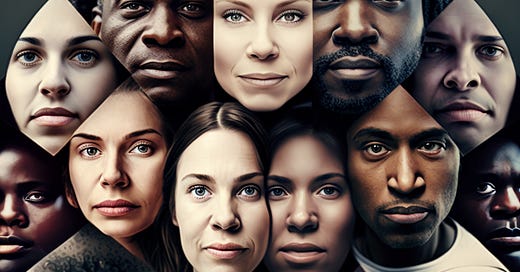Beyond the Surface: Finding Our Shared Essence
The True Measure of a Person
What defines someone? Too often we judge by outer aspects like ethnicity or belief systems. But peering deeper, beyond societal labels, we find our shared humanity. Therein lies the true essence of a person.
As Mahatma Gandhi declared, “The best way to find yourself is to lose yourself in the service of others.” This points to selflessness as the ultimate measure of worth. By uplifting others through compassionate action, we uplift ourselves.
Jesus taught to assess by fruits, Buddha to live with compassion always. Daily we shape our humanity by lifting those around us—holding a door, listening to a friend. Life offers endless chances to choose empathy over apathy, patience over anger, generosity over indifference.
Immerse Yourself in Others' Perspectives to Develop Empathy
True understanding takes immersing yourself in another’s perspective before judging. As Atticus Finch advised in To Kill a Mockingbird, “You never really understand a person until you climb into his skin and walk around in it.”
Stepping outside our own experience forges empathy—the ability to deeply comprehend another’s emotions and worldview. This vulnerable openness bridges surface differences.
When someone shares the trauma of a family member surviving Auschwitz, we may glimpse the depths of injustice. Understanding others’ struggles also reflects back our flaws. Growth lies in leaning into that discomfort to gain wisdom.
Witnessing a loved one bravely step into their truth, despite fear and uncertainty, can expand our capacity for empathy. We immerse ourselves in their journey to forge connection.
Actions Speak Loudest About Character
Words are wind, action reveals character. This rings true in Jesus’ teaching to assess by fruits, Buddha’s reminder to show compassion always. By lifting others through kind words and deeds, we sculpt our best selves.
Elie Wiesel declared our lives belong not just to us but those desperately needing us. We measure life best not by fleeting pleasures but service—brightening someone’s day, volunteering, mentoring a teen. Living selflessly, we leave a lasting legacy.
Of course we sometimes stumble practicing ideals. Hearing an outburst of road rage in front of a young passenger, one may feel shame yet use it as a teaching moment about managing emotions. We grow more through transgressions followed by honest reflection than idle virtue signaling.
Volunteering at a shelter, we may judge those seemingly unwilling to get back on their feet. Learning one lingers outside to avoid PTSD triggers offers insight. Offering empathy without assumptions is an imperfect work in progress.
Be the Change You Wish to See
Gandhi urged us to “be the change we wish to see.” This influenced Martin Luther King Jr. during the civil rights movement who called for meeting darkness with light through nonviolence rooted in love.
This path requires summoning our highest self. When confronted by those spreading fear or hatred, we might take a breath and respond with compassion. Choosing peace creates ripples of transformation. Small acts of courage driven by wisdom gradually build a just world.
After 27 unjust years in prison, Nelson Mandela catalyzed the end of apartheid in South Africa with a miraculous lack of bitterness. He explained, "As I walked out the door toward freedom, I knew if I didn't leave my hatred behind, I'd still be in prison." Like him, we can strive to release resentments over wrongs through understanding.
The Freedom to Choose Our Response
Nazi death camp prisoner Viktor Frankl realized even amidst suffering, we retain freedom to choose our attitude and meaning. As Frankl wrote, “Everything can be taken from a man but one thing: the last of the human freedoms—to choose one's attitude.”
By meeting darkness with light, we bring meaning to our lives. Frankl called this “accelerated self-realization”—adversity wakes us up to our potential. His philosophy empowered others like Nelson Mandela who despite imprisonment dismantled apartheid. No one could take Mandela’s free spirit, which fueled a movement.
Through all of life’s ups and downs, we retain the inner freedom to shape our response. This unique human gift grants us authorship of our essence.
Live Your Purpose
Circumstances of birth and cultural programming do not define our worth. Our essence unfolds by living our truths.
We each have a canvas on which to paint a masterpiece and contribute our gifts. Mandela created his magnum opus from a prison cell, Mother Teresa from the slums of Calcutta, Gandhi from humble ashrams.
Our purpose is to grow more fully human, walking each other home with empathy. Every day offers chances to express our essence through ripples of kindness, truth, joy. Our actions weave our life story. Simple acts like comforting a crying baby or rescuing a struggling turtle remind us of our shared bonds.
Conclusion
At our core, we are spiritual beings on this human adventure together. We all seek meaning and connection. May we immerse ourselves in each other’s experiences to forge understanding.
As artists painting the masterpieces of our lives through daily choices, may we create colors of compassion. By uncovering our shared nobility, we sculpt a society of empathy. With wisdom, courage and love, together we can transform darkness into light.



